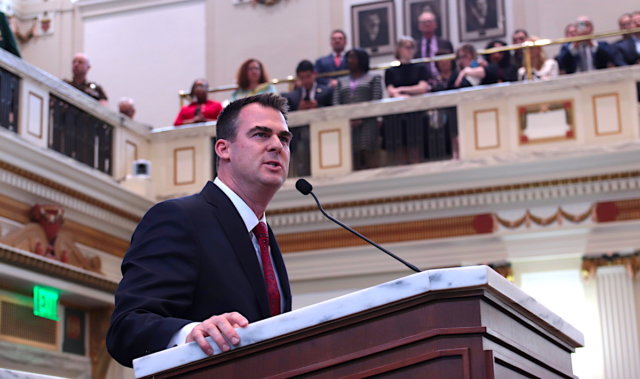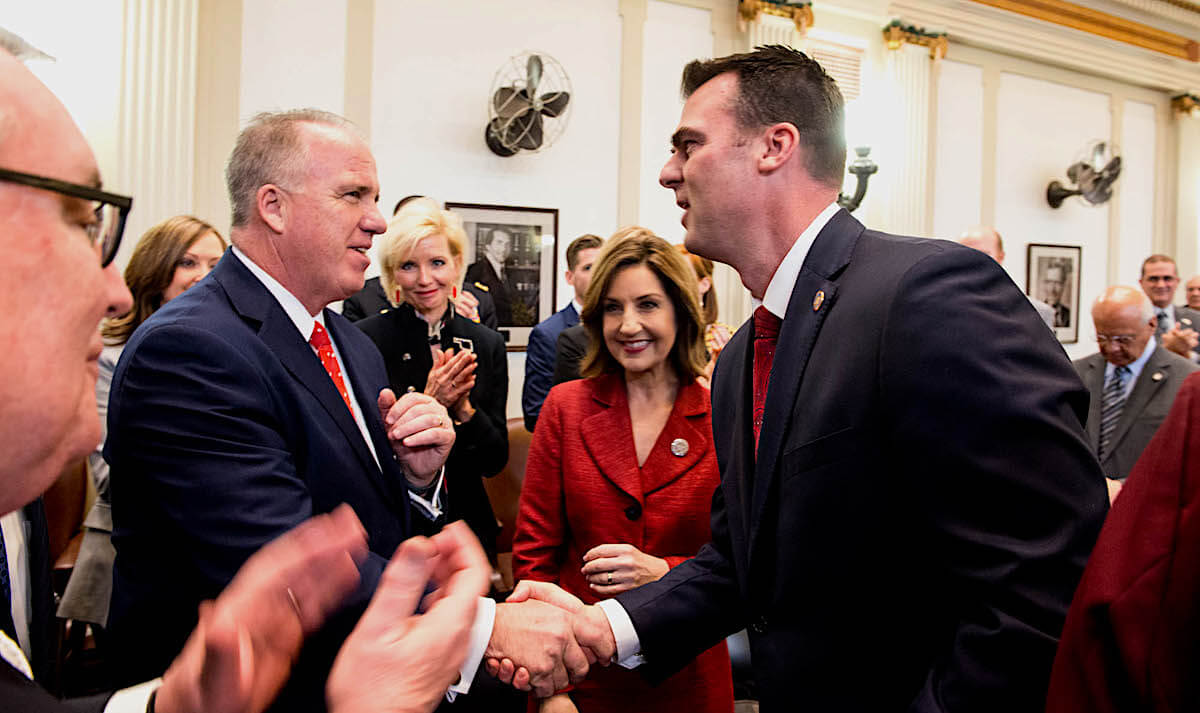
If the annual joke is that the Oklahoma Legislature uses the governor’s proposed executive budget as a doorstop, members of Gov. Kevin Stitt’s cabinet hope his “consensus-building approach” will help move his proposed fiscal prudence forward.
“It’s definitely big enough to be a doorstop,” Secretary of Budget Mike Mazzei told reporters this morning at an embargoed presentation of the governor’s proposed FY 2020 budget. “But we are hopeful that is changing. (…) We really want to have an inclusive, consensus-building approach which hopefully lends to a higher level of consideration of the governor’s strategy than maybe there has been in the past.”
Stitt delivered his strategy and vision for Oklahoma during his first State of the State address today, proposing a raise in teacher pay and an extra emphasis on saving for rainy days. But his proposal included no increase for classroom dollars, something many teachers have emphasized.
“We are confronted with a nationwide teacher shortage. This is not a problem unique to our state, but Oklahoma was among the hardest hit,” Stitt said. “With recent revenue growth, I ask the Legislature to bring our teachers to No. 1 in our region in pay and benefits. This amounts to a $1,200 increase per teacher.”
Stitt outlined his proposal for the state to address “more than $230 million in obligations and another $151 million in critical needs.” The obligations include debt payments, property tax reimbursements for manufacturing exemptions and other items.
Among Stitt’s $151 million in “critical needs” are dollars for the additional teacher pay hike ($70.6 million), proposed audits for the state’s 12 highest-funded agencies and replacement of federal matching funds for the Children’s Health Insurance Program.
In all, Stitt’s proposed FY 2020 appropriations to 65 state agencies would come in $182.8 million above the previous year, leaving between $250 million and $380 million untouched as additional savings held in the State Treasurer’s Office, depending upon the Board of Equalization’s final estimates at its Feb. 20 meeting.
With Oklahoma’s Rainy Day Fund expected to come close to reaching $878 million (the constitutionally-required 15 percent threshold of state finances), the Stitt administration emphasized a goal of withholding at least $250 million more. From the governor’s budget book:
We believe financial sustainability to be an important objective. To adequately prepare for the next downturn, we recommend a cash savings target of at least $1.1 billion, which still does not even match two months of general appropriations.
“Any prudent family, any prudent small business or big business would generally have at least two to three months of expenses in cash to deal with the next downturn or unexpected disruption,” Mazzei told reporters early Monday. “That, of course, hasn’t happened in the past, and unfortunately a lot of our agencies and a lot of our core services took it on the chin because we were not properly prepared for economic downturns and drops in petroleum prices.”
Mazzei said the governor is supportive of filed legislation that would increase the Rainy Day Fund’s cap to 30 percent of the state budget. Such a change would require a vote of the people, however.
Executive budget a ‘good tutorial’ for new #okleg
At 590 pages, Stitt’s FY 2020 proposed executive budget is linked here as a hefty PDF fitting of the proverbial door stop. But Mazzei said he believes it presents an excellent resource for lawmakers and the public whether the Legislature follows the recommendations or not.
“A new legislator could go to that 15-page section of the document and get a very good tutorial on how our budget system works,” Mazzei said, pointing to the budget’s final pages. “So when you put all that together, we hope this is a very valuable reference and educational tool for people who want to understand the financial process of the state.”
‘Criminal justice reform is an important part of his strategy’

If the Legislature does follow Stitt’s recommendations, they could appropriate three chunks of new money for the issue of criminal justice reform:
- $10 million for the County Community Safety Investment Fund (created by SQ 781) to create intervention and addiction treatment programs
- $1.5 million for completion of a Pay for Success contract with the Women in Recovery Program
- $150,000 for the Pardon and Parole Board “to hire two additional field staff to expedite critical work activities related to the investigation and processing of pardons and paroles,” according to Stitt’s budget.
“The governor does not want Oklahoma to be number-one in the nation for incarceration, so criminal justice reform is an important part of his strategy,” Mazzei said.
Friday morning, leaders of the Oklahomans for Criminal Justice Reform Group held a press conference to release its 2019 legislative agenda, which included a call for retroactive implementation of State Question 780’s reclassification of drug possession and theft crimes.
“Because of very convoluted, twisted policies, we have the highest incarceration rate in the country. We have to deal with that,” OCJR board member Gene Rainbolt said Friday. “We need to not focus on ‘tough on crime.’ What they need to be saying is ‘tough on violent crimes,’ and what we need to focus on is treating people who have mental health (issues) and addiction as people with health problems instead of sending them to prison.”
On Jan. 30, Stitt attended a forum hosted by the Associated Press and said he was “open” to SQ 780 retroactivity. He also said he wanted to see reform of how Oklahoma’s prosecutors are funded.
“To me, we can’t have an incentive to have heavy fines, fees and court costs that contribute to our incarceration problems,” Stitt said at the AP forum. “So I’m looking at working with the Legislature to push forward bills to where the fines and fees come to the Legislature, and then the Legislature appropriates the correct amount of money to the district attorneys who, by the way, do a fantastic job.”
But a review of the text of Stitt’s State of the State speech showed no reference to the issue Monday, leaving it perhaps for negotiation with legislators as the 2019 session moves forward. In Stitt’s numbers released Monday, district attorneys and the District Attorneys Council would receive the same appropriation afforded them last year: $36.1 million.
Stitt’s executive budget leaves most agency appropriations unchanged from last year. Throughout his speech Monday, he emphasized his plan for “savings.”
“Being conservative with our budget surplus today will protect Oklahoma from having to cut core services in the future,” Stitt said near the end of his speech. “As I close, let us remember, the future doesn’t just happen. We make it happen. As public servants, our responsibility and purpose are to ensure a better future for all four million Oklahomans. This will require us to be good listeners, continuous learners, committed communicators, and bold leaders — both inside the building and around the state.”
Democrats respond, push for Medicaid expansion
House Minority Leader Emily Virgin (D-Norman) held a press conference shortly before 2 p.m. Monday and praised Stitt’s comments about criminal justice reform but questioned his statements that were skeptical of any potential Medicaid expansion.
“We were confused by his comments on health care when you compare those to his comments he gave the press last week when he said he was open to Medicaid expansion,” Virgin said. “We think that, as a businessman, he knows that when you have a nine-to-one match, you take that deal, especially when it’s going to help the state as much as this program would.”
In his speech, Stitt appeared to walk back his comments at the Jan. 30 AP forum indicating he would be open to finding federal approval for a version of Medicaid expansion.
“While Medicaid expansion currently stops at a 90 percent federal match, we cannot assume that it will remain this high forever,” Stitt said in his State of the State speech. “The estimated $150 million price tag today for Oklahoma to expand Medicaid could leave us down the road fronting more than $1 billion when the federal government pulls back on its commitment. They’ve done it before and they will do it again.”
Sen. Kay Floyd (D-OKC) also spoke to media Monday afternoon and said her caucus remains hopeful for a Medicaid expansion deal this session.
“Health care should not be a partisan issue,” Floyd said.
(Editor’s note: This story was updated at 2:19 p.m. Monday, Feb. 4, 2019, to include comments from Democratic legislative leaders. Oklahomans for Criminal Justice Reform advertises on NonDoc.)





















